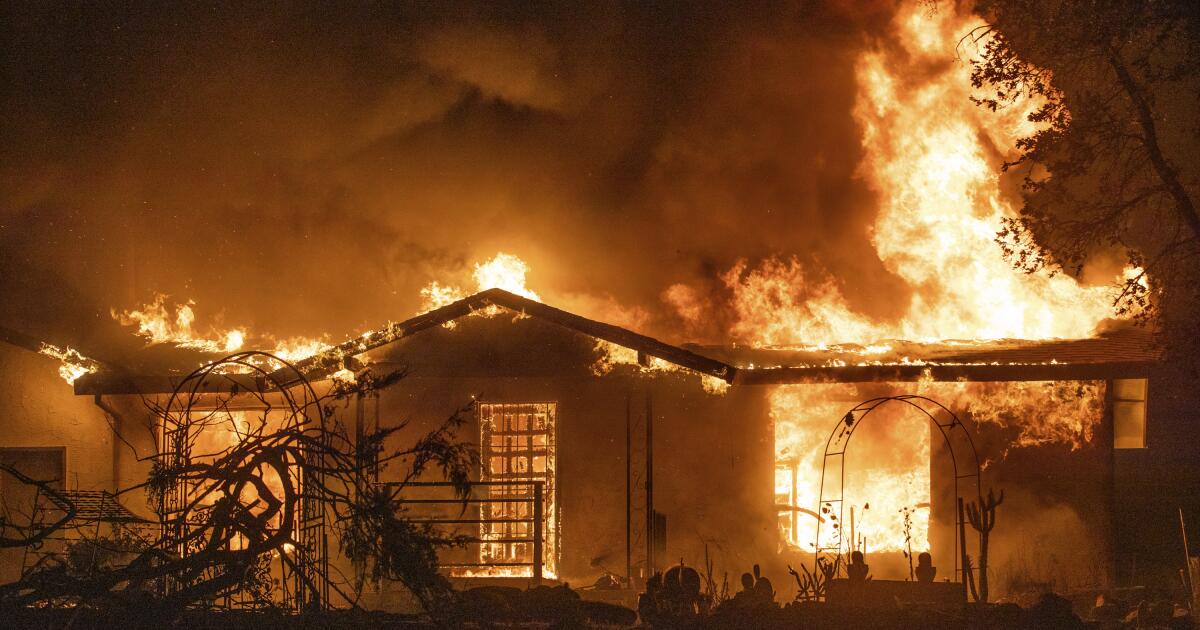
Insurance companies collected more than $150 billion in premiums from California homeowners over the last 25 years and enjoyed profits at four times the national average. Now they’re demanding an unprecedented bailout from the California Legislature as the price of continuing to do business here in the wake of wildfire losses.
Industry lobbyists are reportedly negotiating with lawmakers, Insurance Commissioner Ricardo Lara and Gov. Gavin Newsom’s office toward a deal that would be unveiled in the last weeks before the Legislature adjourns on Sept. 14. The industry’s plan would advance its decades-long drive to undermine the protections of Proposition 103, the insurance reform measure passed by voters 35 years ago. The proposal would allow insurance companies to hike rates without full transparency or justification; force policyholders to assume the staggering costs of insurers’ backup coverage for unexpected losses; and use secret algorithms to set premiums.
These currently illegal practices are likely to raise property insurance premiums by 40% or more. Many more customers could be forced into the California FAIR (Fair Access to Insurance Requirements) Plan, a state-created, industry-controlled association that offers less generous, last-resort coverage at higher prices.
Worse, the proposed bailout relieves insurance companies of their responsibility to cover all losses under the FAIR Plan, forcing the state’s policyholders to shoulder the burden through mandatory surcharges on their insurance bills. The proposal would incentivize insurance companies to push their riskiest customers into the FAIR Plan and make other policyholders subsidize their claims. Insurers would retain only their most profitable customers.
Some lawmakers have suggested that capitulating to the industry’s demands for deregulation, vastly higher premiums and zero risk is necessary to lure insurance companies back to California. Companies such as State Farm, Allstate and Farmers have orchestrated an insurance shortage in the state by refusing to sell new policies and improperly dumping existing customers. But the companies’ proposal does not guarantee that anyone who wants to buy insurance coverage will be able to do so.
Nor has surrendering to industry demands worked in Florida. Under Gov. Ron DeSantis, rate regulation is weak, insurers are opaque and companies are allowed to pass on the cost of reinsurance and impose surcharges on policyholders if the state’s FAIR Plan equivalent falls short. And yet homeowner premiums are two to three times higher than in California, the proportion of policyholders with last-resort insurance is five times greater, and companies are rapidly abandoning the state anyhow.
Under the California Constitution, the Legislature is barred from amending the terms of Proposition 103 except to further the initiative’s purposes. Courts have repeatedly invalidated legislation that weakens those reforms, as the industry’s latest proposal does. Whatever their personal views, lawmakers must respect the voters’ will and insist that insurance companies do the same.
By waiting until the last days of legislative business to negotiate such a bailout, lawmakers are cynically attempting to bypass public scrutiny and debate while undermining the credibility of their institution. As the Legislature’s 1996 deregulation of utility rates showed, poorly vetted, industry-backed proposals can become costly debacles for California consumers and taxpayers.
There are many legitimate ways to address the impact of wildfires and other extreme weather events without bailing out the industry or allowing it to avoid transparency and accountability. Our leaders should take the time to look into them.
For example, money from a proposed climate bond and the state’s cap-and-trade program could be deployed to help homeowners take precautions that reduce the risk of loss from extreme events such as wildfires. Rather than allowing insurance companies to make land use policy through rates, state and local authorities ought to develop rational rules to guide construction in high-risk areas. And insurance companies should be given a deadline to stop insuring and investing in the oil and gas companies that are fueling climate change.
Finally, as a condition for the privilege of selling any kind of insurance in California, companies must be required to cover all homeowners who have taken appropriate measures to protect their property. And insurers that choose to leave the state should not be allowed to return for five years. Companies that collect our premiums for decades and then suddenly decide they don’t want to obey our laws should not be allowed to do business in the largest and most lucrative insurance market in the nation.
Harvey Rosenfield is the founder of Consumer Watchdog and the author of Proposition 103.

